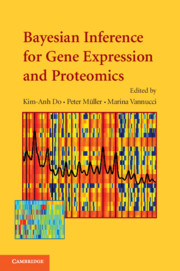Book contents
- Frontmatter
- Contents
- List of Contributors
- Preface
- 1 An Introduction to High-Throughput Bioinformatics Data
- 2 Hierarchical Mixture Models for Expression Profiles
- 3 Bayesian Hierarchical Models for Inference in Microarray Data
- 4 Bayesian Process-Based Modeling of Two-Channel Microarray Experiments: Estimating Absolute mRNA Concentrations
- 5 Identification of Biomarkers in Classification and Clustering of High-Throughput Data
- 6 Modeling Nonlinear Gene Interactions Using Bayesian MARS
- 7 Models for Probability of Under- and Overexpression: The POE Scale
- 8 Sparse Statistical Modelling in Gene Expression Genomics
- 9 Bayesian Analysis of Cell Cycle Gene Expression Data
- 10 Model-Based Clustering for Expression Data via a Dirichlet Process Mixture Model
- 11 Interval Mapping for Expression Quantitative Trait Loci
- 12 Bayesian Mixture Models for Gene Expression and Protein Profiles
- 13 Shrinkage Estimation for SAGE Data Using a Mixture Dirichlet Prior
- 14 Analysis of Mass Spectrometry Data Using Bayesian Wavelet-Based Functional Mixed Models
- 15 Nonparametric Models for Proteomic Peak Identification and Quantification
- 16 Bayesian Modeling and Inference for Sequence Motif Discovery
- 17 Identification of DNA Regulatory Motifs and Regulators by Integrating Gene Expression and Sequence Data
- 18 A Misclassification Model for Inferring Transcriptional Regulatory Networks
- 19 Estimating Cellular Signaling from Transcription Data
- 20 Computational Methods for Learning Bayesian Networks from High-Throughput Biological Data
- 21 Bayesian Networks and Informative Priors: Transcriptional Regulatory Network Models
- 22 Sample Size Choice for Microarray Experiments
- Plate section
4 - Bayesian Process-Based Modeling of Two-Channel Microarray Experiments: Estimating Absolute mRNA Concentrations
Published online by Cambridge University Press: 23 November 2009
- Frontmatter
- Contents
- List of Contributors
- Preface
- 1 An Introduction to High-Throughput Bioinformatics Data
- 2 Hierarchical Mixture Models for Expression Profiles
- 3 Bayesian Hierarchical Models for Inference in Microarray Data
- 4 Bayesian Process-Based Modeling of Two-Channel Microarray Experiments: Estimating Absolute mRNA Concentrations
- 5 Identification of Biomarkers in Classification and Clustering of High-Throughput Data
- 6 Modeling Nonlinear Gene Interactions Using Bayesian MARS
- 7 Models for Probability of Under- and Overexpression: The POE Scale
- 8 Sparse Statistical Modelling in Gene Expression Genomics
- 9 Bayesian Analysis of Cell Cycle Gene Expression Data
- 10 Model-Based Clustering for Expression Data via a Dirichlet Process Mixture Model
- 11 Interval Mapping for Expression Quantitative Trait Loci
- 12 Bayesian Mixture Models for Gene Expression and Protein Profiles
- 13 Shrinkage Estimation for SAGE Data Using a Mixture Dirichlet Prior
- 14 Analysis of Mass Spectrometry Data Using Bayesian Wavelet-Based Functional Mixed Models
- 15 Nonparametric Models for Proteomic Peak Identification and Quantification
- 16 Bayesian Modeling and Inference for Sequence Motif Discovery
- 17 Identification of DNA Regulatory Motifs and Regulators by Integrating Gene Expression and Sequence Data
- 18 A Misclassification Model for Inferring Transcriptional Regulatory Networks
- 19 Estimating Cellular Signaling from Transcription Data
- 20 Computational Methods for Learning Bayesian Networks from High-Throughput Biological Data
- 21 Bayesian Networks and Informative Priors: Transcriptional Regulatory Network Models
- 22 Sample Size Choice for Microarray Experiments
- Plate section
Summary
Abstract
We present a Bayesian process-based model for spotted microarray data incorporating available information about the experiment from target gene preparation to image analysis. We demonstrate that, using limited calibration data, our method can estimate absolute gene concentrations from spotted microarray intensity data. Number of transcripts (copies of the gene sequence) per microgram total RNA are obtained for each gene, enabling comparisons of transcript levels within and between samples. All parameters are estimated in one Markov chain Monte Carlo run thereby propagating uncertainties throughout the model. We reparameterize the core of the model, binomial selection, and show identifiability of the parameters. Using a small data set, we illustrate potentials of our method discriminating it from conventional, ratio-based methods. This chapter gives a thorough description of the statistical methodologies that form the foundation of the biology-focused companion paper.
Introduction
Analysis of microarray data is challenging due to the huge number of measurements made in each experiment and the large uncertainty associated with it. When spotted cDNA microarrays are used, gene expression levels are generally measured as a log-ratio of the fluorescence intensity of two cDNA samples to reduce systematic effects in the data, though biological information that lies in the absolute concentrations may be lost. Samples are derived from mRNA by reverse transcription and dye labeling and cohybridized to an array of DNA probes on a microscope slide. The intensities are measured by imaging the array in an optical scanner. There are several sources of variation associated with each step in the experimental procedure that influence the measured intensities, and hence the expression.
- Type
- Chapter
- Information
- Bayesian Inference for Gene Expression and Proteomics , pp. 75 - 96Publisher: Cambridge University PressPrint publication year: 2006



